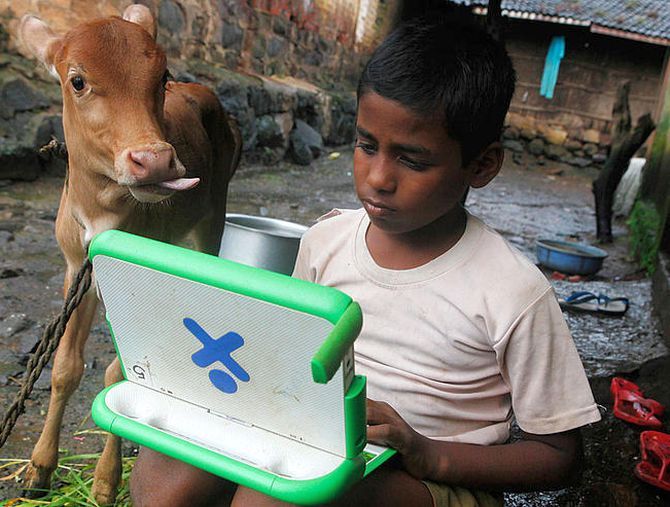Prime Minister Narendra Modi has managed to pull off what was unimaginable a year back -- adopting a much-needed centre-left approach, says Devanik Saha.

Narendra Modi came to power on the promise of turning India into a developed country and possibly making it a superpower. His election campaign was focused on how the Congress had ruined the country in 60 years and kept it poor. Indeed, his rhetoric struck a chord with the masses which led to India getting its first ever non-Congress majority government.
However, things didn’t turn out to be as great as Modi and India both would have wanted it to. Exports decreasing every month. Only 0.2 pc growth in agriculture in 2014-15. Unsold inventories in real estate. Slowdown in manufacturing. Nine states declared a drought due to deficient rainfall.
Though the effects of sluggish economic growth have hurt the entire country, rural India has bore the maximum brunt. With four consecutive droughts owing to erratic weather patterns and unseasonal rainfall, agriculture has been the worst hit.
Maharashtra saw 3228 farmer suicides in 2015, an unprecedented number. Apart from Maharashtra, Bundelkhand has been an epicentre of suicides and rural distress since the past few years. A survey done by the Swaraj Abhiyan led by Yogendra Yadav and Jean Dreze revealed some horrific facts.
96 pc of households surveyed reported a total loss of crops. Sixty percent of general households haven’t consumed milk even once in the past 30 days. Some 79 pc of households reported eating rice and roti with just salt or chutney on a few occasions.
With 70 pc of India’s population in deep distress and anguish, would the idea of India being an economic superpower and the fastest growing economy make sense?
Definitely not.
But it appears that 2016 will be different as Modi looks to change his approach. If news reports are to be believed, it appears that Modi has realised the importance of revitalising the rural economy and give it the much needed impetus. A slew of developments make this evident.
The MNREGA, which has been hailed by the World Bank for reducing poverty in India, is being praised by the Bharatiya Janata Party and attempts are being made to widen the programme’s scope. This is indeed a surprising move as Modi himself had criticised it in Parliament last year.
The massive National Food Security Act which was launched by the United Progressive Alliance, is being prepared for a repackaged rollout with a budgetary allocation of Rs 1,30,000 crore.
The recently launched crop insurance scheme is another promising initiative to woo farmers.
Not just initiatives and schemes, Modi’s change in stance was palpable in his speech at the Economic Times Global Business Summit as well, where a significant portion of his speech mentioned about empowering the poor and marginalised.
At one point, he said, “When a benefit is given to farmers or to the poor, experts and government officers normally call it a subsidy. However, I find that if a benefit is given to industry or commerce, it is usually called an ‘incentive’ or a ‘subvention’.”
And then he added, “I am not arguing that all subsidies are good. My point is that there cannot be any ideological position on such matters. We have to be pragmatic. We have to eliminate bad subsidies, whether or not they are called subsidies. But some subsidies may be necessary to protect the poor and the needy and give them a fair chance to succeed.”
Through his brilliant play of words, Modi laid out the message that in the coming year, focusing on empowering the poor and giving them subsidies for economic participation, will be one of his key focuses.
In an interview last year, noted economist Amartya Sen stated a very important point. “India is the only country in the world which is trying to become a global economic power with an uneducated and unhealthy labour force. It’s never been done before, and never will be done in the future either. There is a reason why Europe went for universal education, and so did America.”
His comment holds immense significance in India’s context which is why I believe that Modi’s focus on rejuvenating the rural economy is a welcome start, if not anything else. There is much more to be done, but for now hunger and financial inclusion should be the priority.
Of course, the devil lies in effective implementation of policies, but at least Modi has managed to pull off what was unimaginable a year back -- adopting a much-needed centre-left approach, and in a way validating what R Jagannathan of Swarajya, said: ‘This is the space where elections can be won.’
Most of 2015, the BJP was criticised for not doing enough to contain the rural distress and Modi’s regular foreign trips gave the opposition parties a chance to target them even more. Therefore, Modi’s fresh focus on reaching out to the poorest of poor in rural areas will give some relief to the severely distressed rural population and help the BJP to fight its “Suit boot ki sarkar” image.
Though his supporters have expressed their disappointment and argued that he is committing the same mistakes as the previous Congress government, in my opinion, Modi’s new avatar will go a long way (if implemented efficiently) in reviving the rural economy and preparing the base for tapping India’s potential and eventually achieving ambitious economic goals.










